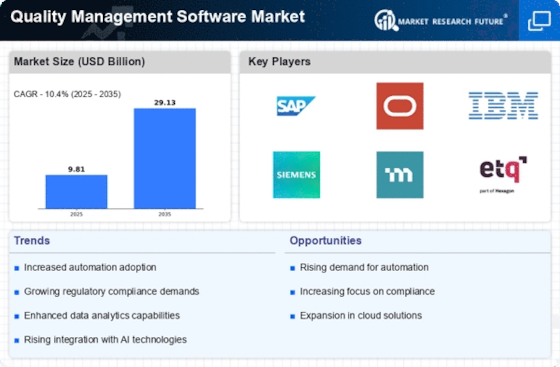Top Industry Leaders in the Quality Management Software Market

Competitive Landscape of the Quality Management Software Market
The quality management software (QMS) market is experiencing a surge, driven by a global focus on operational excellence and compliance. This dynamic landscape is characterized by established players, emerging startups, and innovative strategies, making it crucial for businesses to understand the competitive terrain. This analysis delves into the key players, market share factors, new entrants, and investment trends shaping the QMS landscape.
Key Players and Their Playbooks:
- Pilgrim Quality Solutions Inc. (U.S.)
- Sparta Systems Inc. (U.S.)
- IQS Inc. (U.S.)
- MasterControl Inc. (U.S.)
- MetricStream Inc. (U.S.)
- SAP SE (Germany)
- Plex Systems Inc. (U.S.)
- Arena Solutions Inc. (U.S.)
- Intelex Technologies Inc.(Canada)
- QUMAS (U.S.)
Strategies Adopted for Market Share Gain:
- Innovation Arsenal: Continuous investment in R&D is paramount. This includes advancements in areas like artificial intelligence (AI), data analytics, and automation to streamline processes and enhance decision-making.
- Partnership Network: Strategic alliances expand reach and expertise. QMS providers partner with technology vendors, consultants, and industry associations to offer integrated solutions and access untapped markets.
- Subscription Model Magic: The shift from perpetual licenses to subscription models fosters customer loyalty and recurring revenue streams. Flexible pricing options catering to diverse organization sizes further fuel market penetration.
- M&A Maneuvers: Mergers and acquisitions are accelerating industry consolidation. Established players acquire niche specialists to bolster their portfolios and enter new markets, while smaller companies merge to compete with larger rivals.
Factors for Market Share Analysis:
- Product Breadth and Depth: The comprehensiveness of the QMS solution offered, encompassing functionalities like document management, non-conformance tracking, corrective action workflows, and data analytics, plays a crucial role.
- Industry Focus: Targeting specific industries with tailored solutions and regulatory expertise allows for deeper market penetration and higher customer satisfaction.
- Deployment Flexibility: Offering both cloud-based and on-premise deployment options caters to diverse customer preferences and infrastructure realities.
- Scalability and Integration: Solutions that seamlessly integrate with existing systems and scale according to business growth attract growing interest.
New and Emerging Companies:
The QMS market is witnessing a constant influx of innovative startups leveraging cutting-edge technologies. Companies like Clarizen and Evisort are disrupting the space with AI-powered QMS solutions that automate tasks, predict quality issues, and personalize user experiences.
Current Investment Trends:
- Cloud Migration Frenzy: The shift towards cloud-based QMS solutions is accelerating, driven by their improved accessibility, scalability, and lower maintenance costs. Cloud providers like Salesforce and Microsoft are also entering the fray, offering QMS functionalities within their broader platforms.
- AI Integration Boom: Embracing AI and machine learning is becoming a key differentiator. Companies are integrating AI for automated document analysis, root cause identification, and predictive quality control, enhancing efficiency and risk mitigation.
- Mobile Focus: Catering to a mobile workforce is crucial. QMS providers are developing user-friendly mobile apps for document access, task management, and data capture on the go.
Product Launches and Innovations:
- Siemens PLM Software introduces a new cloud-based QMS solution, MindSphere Quality Management, targeted at manufacturers. (October 27, 2023)
- Intelex releases version 10.7 of its QMS platform, featuring AI-powered risk assessment and improved non-conformance management. (November 22, 2023)
- TrackVia launches a new mobile app for its QMS platform, allowing for easier data capture and real-time visibility into quality processes. (December 07, 2023)
Challenges and Opportunities:
- Data security and privacy concerns remain a key challenge for the QMS market. (November 10, 2023)
- Integration with existing enterprise systems can be complex and costly. (December 14, 2023)
- The rise of low-code and no-code QMS solutions offers opportunities for increased accessibility and affordability. (January 12, 2024)










